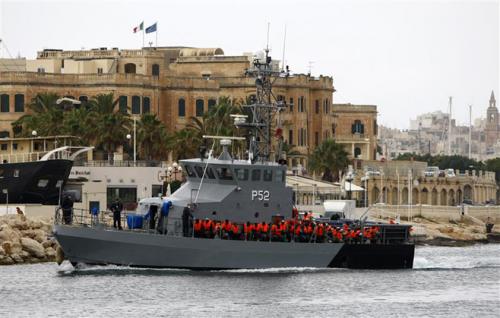EU: Needless Deaths in the Mediterranean
Coordinated Action Needed to Improve Rescue of Boat Migrants
Rescue operations in the Mediterranean are hampered by poor coordination, disputes over responsibility, disincentives for commercial vessels to conduct rescues, and an emphasis on border enforcement, Human Rights Watch said in a briefing paper published today.

A Malta patrol boat carrying 76 African immigrants, fleeing Libya, arrive in Malta on June 1, 2011.
People fleeing persecution or seeking a better life attempt the dangerous crossing from the North African coast to Europe, often in unseaworthy and dangerous boats. An Eritrean man lived to tell of the deaths of all 54 of his fellow passengers when their small dinghy sank in the Mediterranean in early July, 2012, bringing the known death toll this year to 170. As many as 13,500 people have died in such efforts at crossing since 1998, including at least 1,500 in 2011, the deadliest on record.
“It is chilling to think how many of these deaths could have been prevented,” said Judith Sunderland, senior Western Europe researcher at Human Rights Watch. “Saving lives, not deflecting responsibility, needs to be the imperative at sea.”
The most notorious example of failed rescue operations occurred in April 2011, known as the “left-to-die boat” case. A disabled migrant boat with 72 people fleeing Libya was ignored and drifted for two weeks in the Mediterranean at a time when the area was heavily patrolled by NATO forces as well as criss-crossed by commercial ships.
By the time the boat drifted back to Libyan shores, 61 people had died. Two more died after arrival. An in-depth inquiry by the Council of Europe’s Parliamentary Assembly identified a “catalogue of failures” that caused the deaths. Serious questions remain about why the boat was not assisted despite distress alerts and contact with military and commercial vessels, Human Rights Watch said.
The European Union is developing a new European External Border Surveillance System, EUROSUR. It includes rescue at sea as a main objective, but does not include specific guidelines or procedures to ensure this objective is reached.
Preventing deaths at sea needs to be at the heart of a coordinated European-wide approach to boat migration, Human Rights Watch said. During the Arab Spring, the office of the UN High Commissioner for Refugees said that all overcrowded migrant boats in the Mediterranean should be presumed to be in need of rescue. This idea should inform the approach of the European Union toward the rescue of boat migrants.
The eleven-page briefing paper includes concrete recommendations to improve rescue operations and save lives:
◆Improve search and rescue coordination mechanisms among EU member states;
◆Ensure that EUROSUR has clear guidelines on the paramount duty of rescue at sea and that its implementation is rigorously monitored;
◆Clarify what constitutes a distress situation, to create a presumption in favor of rescue for overcrowded and ill-equipped boats;
◆Resolve disputes about disembarkation points;
◆Remove disincentives for commercial and private vessels to conduct rescues; and
◆Increase burden-sharing among EU member states.
Source: Human Rights Watch
- 424 reads
Human Rights
Ringing FOWPAL’s Peace Bell for the World:Nobel Peace Prize Laureates’ Visions and Actions

Protecting the World’s Cultural Diversity for a Sustainable Future

The Peace Bell Resonates at the 27th Eurasian Economic Summit

Declaration of World Day of the Power of Hope Endorsed by People in 158 Nations

Puppet Show I International Friendship Day 2020

